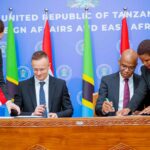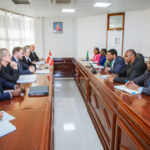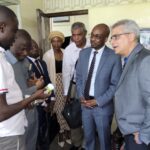A Tanzanian Village Sets a Precedent with Comprehensive Community Health Insurance Enrolment
In a noteworthy illustration of communal cohesion and visionary governance, Mundindi Village in Tanzania has garnered attention for its success in enrolling the entirety of its population in the Community Health Insurance Fund (CHIF). This pioneering initiative guarantees that every resident in the village has access to fundamental healthcare services, establishing a precedent for other communities in the region and beyond.
A total of 3,149 citizens of Mundindi village, located in Ludewa District in the Njombe region, have made history following the Government of the village’s decision to terminate health insurance coverage for all villagers. This action was taken with the objective of guaranteeing the accessibility of healthcare services without the need for financial constraints.
A Community United for Health
The initiative has been implemented across 431 households, collectively representing 2,586 beneficiaries. This comprehensive enrolment is evidence of the village’s dedication to enhancing the health and well-being of its residents. By ensuring that every individual has health insurance, Mundindi Village is not only safeguarding the health of its citizens but also fostering a sense of unity and collective responsibility.
Financial Backbone: Government Bond Dividends
The financial foundation of this initiative is the annual dividend derived from a government bond purchased by Mundindi Village. The bond, with a value of Tsh 12,930,000/=, was obtained as compensation for the Mchuchuma and Liganga projects. These projects, which have made a significant contribution to the region’s economic development, have also provided the village with a unique opportunity to invest in its future.
The decision to utilise the bond’s dividends to fund the CHIF enrolment represents a strategic move that exemplifies the village’s innovative approach to resource management. By leveraging the financial benefits of the government bond, Mundindi Village has established a sustainable model for funding health insurance, thereby ensuring the long-term viability of the initiative.
The Impact of Comprehensive Health Insurance
It is impossible to overstate the significance of this comprehensive health insurance coverage. The availability of health insurance plays a pivotal role in enhancing public health outcomes. It guarantees that individuals can obtain prompt medical attention, alleviates the financial strain associated with healthcare expenses, and encourages the adoption of preventive healthcare measures.
For the residents of Mundindi Village, the CHIF enrollment has removed a significant financial burden associated with medical treatment. This financial security permits families to seek medical attention when necessary, without concern for the potential burden of significant financial obligations. Furthermore, it facilitates regular health examinations and the early identification of illnesses, which are vital for the effective treatment and management of such conditions.
A Model for Other Communities
The successful CHIF enrollment in Mundindi Village serves as a model for other communities in Tanzania and beyond. This case study demonstrates that with strategic planning, community involvement, and effective use of available resources, it is possible to achieve universal health coverage at the local level.
It is recommended that the village’s approach be replicated in other regions, particularly those with similar socio-economic conditions. By investing in government bonds or other financial instruments, communities can generate the requisite funds to support health insurance initiatives. This model offers residents not only financial security but also the prospect of economic stability and growth.
Community Involvement and Support
The success of the CHIF enrollment in Mundindi Village is also attributable to the robust involvement and support of the local community. The village leadership was instrumental in mobilising residents, raising awareness about the benefits of health insurance, and ensuring the enrolment process was conducted in a smooth and efficient manner.
Community meetings and workshops were convened with the objective of educating residents about the importance of health insurance and the operational aspects of the CHIF. These endeavours contributed to the establishment of trust and confidence in the initiative, thereby ensuring that residents were fully engaged with the enrollment process.
Challenges and Solutions
Although the CHIF enrollment in Mundindi Village was ultimately a success, it was not without its challenges. One of the principal challenges was to guarantee that all residents, in particular those in remote locations, were reached and enrolled. To address this issue, the village leadership implemented a multifaceted strategy, which included door-to-door visits and the utilisation of local volunteers to facilitate the enrollment process.
A further challenge was to guarantee the effective and transparent management of the government bond funds. In order to address this issue, the village established a financial oversight committee with the purpose of monitoring the utilisation of the funds and ensuring their appropriate deployment. The committee, comprising members of the local community and leaders, is of great importance in maintaining accountability and transparency.
Looking Ahead: Sustaining the Initiative
The long-term sustainability of the CHIF enrollment hinges on the continued dedication of the village leadership and residents. One of the principal factors contributing to the sustainability of the programme is the continued management and investment of the government bond dividends. By reinvesting these dividends in a prudent manner, the village can generate supplementary funds to buttress the health insurance initiative.
Furthermore, the village intends to investigate alternative funding avenues, including grants and donations from non-governmental organisations and international agencies.
Background of the Initiative
Historic Decision in Mundindi Village: Government Terminates Health Insurance to Ensure Universal Healthcare Access
In a pioneering initiative, the village of Mundindi, situated within the Ludewa District of the Njombe region, has made a significant impact on the historical record. The local government has resolved to terminate health insurance coverage for all 3,149 villagers. This unparalleled initiative is designed to guarantee that each resident has access to healthcare services without the impediment of financial limitations.
The decision, which has been met with both approval and criticism, is based on the village’s dedication to ensuring that all its residents have access to healthcare on an equal basis. The local government’s intention in eliminating health insurance is to remove the financial barriers that frequently prevent individuals from seeking medical attention.
The Rationale Behind the Decision
The principal objective of this audacious initiative is to ensure that healthcare services are universally accessible, irrespective of an individual’s financial circumstances. In many communities, health insurance can be a double-edged sword, offering benefits and drawbacks to those who possess it. Although it offers coverage for medical expenses, it can also result in a financial burden for those who are unable to afford the premiums. In Mundindi, the local government identified deficiencies in the existing health insurance system, which was failing to meet the needs of all residents.
The termination of health insurance is intended to facilitate the creation of a more inclusive healthcare system at the village level. The local government has pledged to allocate the requisite resources to guarantee the provision of healthcare services free of charge to all residents. The objective of this approach is to eliminate the disparities that often exist in healthcare access and to promote the well-being of the entire community.
Community Reactions
The decision has been met with a range of responses from the local population. Some residents have expressed relief and gratitude, on the grounds that this move will provide much-needed respite from the financial pressures associated with healthcare. The villagers perceive this as a stride towards a more just and equitable society, where all individuals have the chance to obtain medical care without concern for the financial burden.
“One villager offered the opinion that this was a beneficial decision. “The necessity to consider how I will pay for my family’s medical expenses is now a thing of the past.” The focus can now shift to maintaining good health and accessing the necessary care.”
Nevertheless, there are those who question whether this is the optimal methodology. Some villagers have expressed concerns regarding the long-term viability of the new system and the capacity of the local government to provide adequate healthcare services in the absence of financial support from health insurance premiums.
“”While I comprehend the rationale behind this resolution, I am concerned about its potential implications in practice,” stated another resident. “Will the government be able to provide the same level of care without the funding derived from insurance premiums? It is my hope that a robust plan of action will be put in place.”
Government’s Assurance
In response to these concerns, the local government has provided the villagers with a comprehensive plan outlining the measures that will be taken to ensure the success of this initiative. A number of pivotal strategies have been delineated to buttress the nascent healthcare system:
-
Increased Funding: The government has pledged to augment the financial resources allocated to healthcare services. This encompasses the allocation of supplementary resources from the village’s budgetary allotment and the pursuit of external funding from regional and national sources..
-
Healthcare Infrastructure: Financial resources will be allocated to enhance the quality of healthcare infrastructure, encompassing the establishment of new clinics and the refurbishment of existing facilities. This will guarantee that healthcare services are both accessible and of an appropriate standard.
-
Staffing and Training: The government has announced its intention to expand the healthcare workforce and provide ongoing training for these professionals, with the aim of ensuring that they are equipped to meet the needs of the community. This encompasses physicians, nurses, and other medical personnel.
-
Preventive Care: The programme will place particular emphasis on the promotion of preventive care and the dissemination of health education. It is the government’s intention to reduce the overall demand for medical services and to improve the long-term health of the community by promoting healthy lifestyles and early intervention.
-
Community Involvement: The government will engage the community in a proactive manner throughout the planning and implementation phases of the new healthcare system. This encompasses the solicitation of input from residents and collaboration with local organisations to guarantee that the system aligns with the community’s requirements.
Looking Ahead
The termination of health insurance in Mundindi village represents a significant shift in the approach to healthcare. The decision has been met with a range of responses, but it represents a courageous effort to establish a more just and accessible healthcare system. The success of this initiative will depend on the government’s capacity to implement their plan in an effective manner and to address the concerns of the villagers.
As Mundindi embarks on this new venture, it will serve as a case study for other communities facing similar challenges. The experience of the village will provide valuable insights into the feasibility and impact of eliminating health insurance in favour of a more inclusive healthcare system.
Compensation and Financial Allocation
This outcome was reached subsequent to the Tanzanian government’s disbursement of Sh15 billion in compensation for the Liganga and Mchuchuma projects, which encroached upon the village’s territory. The disbursement enabled the village to receive Sh464 million in compensation. Of the aforementioned funds, a sum of Sh400 million was allocated for the purchase of a bond from a financial institution within the country.
Implementation and Community Impact
The information was conveyed today, 12 July 2024, by the Chairman of Mundindi Village, Sapi Mlelwa, during the ceremony to distribute health insurance cards to the citizens, held in the village. He stated that the Sh400 million bond purchase enables the village, comprising 524 households, to receive dividends of Sh41 million annually for a five-year period.
Community Agreement and Initial Dividend
In the inaugural dividend distribution, the villagers collectively agreed to contribute towards the cost of health insurance for one another, with the total value of the insurance coverage amounting to Sh12.9 million. This collective endeavour serves to illustrate the community’s dedication to guaranteeing comprehensive health insurance coverage for all its residents.
Recognition and Future Prospects
Njombe Regional Commissioner Anthony Mtaka posited that the village serves as a model for the entire country, as its leaders have implemented significant innovations to guarantee the well-being of their constituents. This initiative not only provides health insurance for all residents but also establishes a precedent for other villages to emulate.
Questions and Answers
How did the village manage to fund the health insurance for all its citizens?
The village financed the health insurance scheme through the dividends received from a Sh400 million bond purchased using compensation funds from the Tanzanian government for the Liganga and Mchuchuma projects.
What is the significance of this initiative?
This initiative is of considerable significance, as it ensures that all citizens have access to healthcare services without financial constraints, thereby establishing a model for other villages and regions to emulate.
In conclusion, the successful enrollment of Mundindi village residents in the Community Health Insurance Fund (CHIF) represents a noteworthy accomplishment. By leveraging compensation funds and fostering community cooperation, the village has ensured that all its citizens have access to health insurance, thereby enhancing their access to healthcare services. This initiative has the dual benefit of improving the current generation’s access to healthcare while also establishing a sustainable model for future community-driven health insurance programs.
The successful enrollment of Mundindi Village in the Community Health Insurance Fund represents a significant milestone in the field of community-driven health initiatives, establishing a new standard for similar programs. By leveraging the financial benefits of the government bond and fostering robust community involvement, the village has established a sustainable model for universal health coverage.
This initiative ensures that all residents have access to essential health services and, moreover, promotes economic stability and growth. It serves as an inspiring example for other communities, demonstrating that with strategic planning, resource management, and community support, significant improvements in public health and well-being can be achieved.
As Mundindi Village continues to build on this success, it offers a model of best practice and a source of inspiration for other communities striving to improve the health and lives of their residents. The experience of Mundindi Village serves as an illustrative example of the potential for remarkable achievements when a community unites with a common goal.
Tanzania Media
- Kanyala Ferry Launch: TEMESA’s New Service for 15,000 Sengerema Residents (Mwanza) - 18 August 2025
- Russia-Tanzania Naval Cooperation: How the Smolny Training Ship Boosts Dar es Salaam’s Maritime Security - 18 August 2025
- Tanzania’s ICGLR Commitment: Stabilising the DRC & Great Lakes Region - 18 August 2025












































